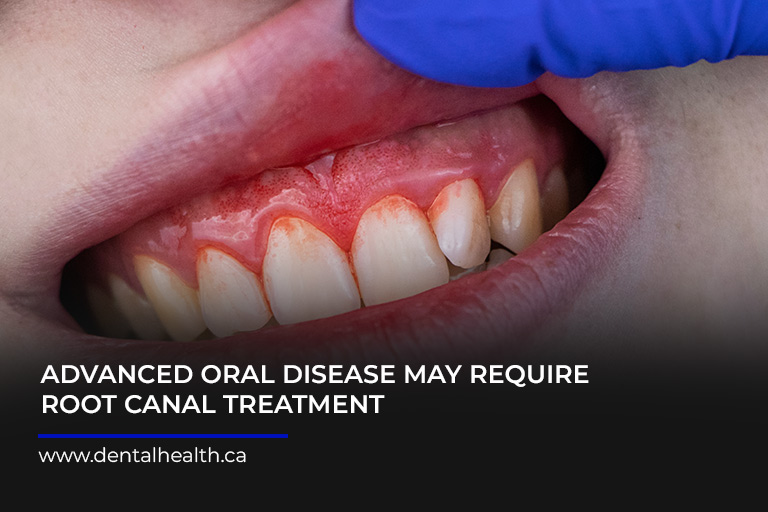A root canal, a common dental procedure, involves removing infected or inflamed pulp from the inside of a tooth. This pulp, a soft tissue containing nerves and blood vessels, can become compromised due to advanced decay, cracks, or trauma. By addressing the infection, a root canal helps prevent further damage and saves the natural tooth, allowing you to maintain your oral health and avoid more extensive procedures like extractions.
Early detection and treatment are key when it comes to root canal issues. Ignoring the signs can lead to severe discomfort, infection, and possibly tooth loss. Knowing the signs and symptoms can empower you to seek timely professional care, ensuring a healthier smile and avoiding complications. In this article, we will explore common indicators that may suggest you need a root canal.
Signs You Need a Root Canal Treatment
While a dentist is the best person to diagnose the need for a root canal, several signs and symptoms may indicate the possibility:
- Persistent Toothache: A persistent toothache, especially one that intensifies when applying pressure or biting, may indicate significant pulp damage, often requiring dental intervention to address the underlying issue and alleviate discomfort.
- Sensitivity to Hot and Cold: Increased sensitivity to hot or cold, particularly if it remains after the temperature stimulus is removed, might be a sign of pulp inflammation, suggesting that the nerve within the tooth is affected.
- Swelling and Tenderness: Swelling or tenderness in the gums adjacent to the affected tooth can signal that an infection has spread beyond the tooth, potentially involving surrounding tissues and necessitating prompt dental care.
- Discolouration: A noticeable darkening or discolouration of a tooth could imply damage to the pulp and possible internal bleeding, suggesting the need for a thorough dental examination to assess the extent of the damage.
- Pimple on the Gum: A small, pimple-like bump on the gum near a tooth might indicate an abscess, which is a pus-filled pocket resulting from infection, and usually requires treatment to prevent further complications.
- Loose Tooth: If a tooth feels loose or appears mobile, it could be due to damage to the surrounding bone caused by an infection, and a dental examination is needed to evaluate and treat the condition
- Bad Breath or Taste: Persistent bad breath or a foul taste, particularly in one tooth, may suggest an infection in the pulp, which often necessitates professional treatment to remove.
- Facial Swelling: In severe cases, an infection can spread to the surrounding tissues, leading to noticeable facial swelling and discomfort, indicating a need for urgent dental intervention to address the infection and relieve symptoms.
Benefits of a Root Canal Treatment

Root canal treatments offer several benefits, making them a valuable option for preserving your natural teeth and oral health:
- Pain Relief: Root canals provide effective pain relief by addressing severe toothaches caused by infected or inflamed pulp, allowing you to return to a comfortable and pain-free state while preserving the tooth’s natural function and appearance.
- Infection Removal: The root canal procedure removes the infection from within the tooth, ensuring that the infection does not spread to surrounding teeth or bone, preventing further complications and preserving the integrity of your oral health.
- Tooth Preservation: Root canal saves your natural tooth, which helps maintain your smile’s natural appearance and functionality, avoiding the need for more invasive treatments and ensuring long-term dental health.
- Improved Oral Health: Addressing the infection through a root canal improves overall oral health by eliminating the source of the problem, which contributes to better well-being and reduces the risk of further complications or infections in your mouth.
- Cost-Effectiveness: Unlike other tooth extraction and replacement options, such as implants or bridges, root canals are often a less expensive long-term solution.
- Natural Appearance: After a root canal, your tooth is fitted with a crown that matches the colour and shape of your natural teeth, ensuring a seamless appearance and allowing you to smile confidently without noticeable differences in your dental work.
- Long-Term Success: With proper care and maintenance, root canals boast a high success rate, enabling you to keep your restored tooth functioning effectively for many years, thereby reducing the need for additional dental treatments or replacements.
- Enhanced Chewing Function: By preserving your natural tooth through a root canal, you maintain essential chewing function, which is crucial for effective digestion and overall health, ensuring that you can continue to enjoy a varied and nutritious diet.
Conditions That May Need Root Canal Treatment

Several dental conditions can lead to the need for a root canal treatment:
- Deep Decay: When tooth decay progresses deeply into the pulp chamber, bacteria can infect the pulp and cause significant damage, making root canal therapy necessary to remove the infection and restore the tooth’s health and functionality.
- Cracked or Chipped Tooth: A crack or chip that extends into the tooth’s pulp can expose the internal tissues to bacteria, leading to infection. In such cases, a root canal becomes essential to remove the infection and repair the damage.
- Trauma: Trauma from a blow to the mouth or tooth can damage the pulp even if no visible external cracks or chips are evident. This internal damage often necessitates a root canal to alleviate pain and restore dental health.
- Repeated Dental Procedures: Repeated dental operations on the same tooth could compromise its structure and make it more susceptible to pulp injury. If the pulp becomes compromised, a root canal may be required to address the resulting infection and preserve the tooth.
- Failed Previous Treatment: When a previously treated tooth develops new decay or infection, it can sometimes necessitate a root canal to resolve the issue. This procedure helps manage the new infection and maintain the tooth’s integrity.
- Gum Disease: Advanced gum disease can cause infections that extend into the roots of the teeth. In such cases, a root canal may be required to address the infection within the tooth in addition to treating the gum disease.
Recognizing the signs and symptoms of potential root canal issues is crucial for timely intervention and preserving your natural teeth. Remember, early detection and treatment can save your tooth and prevent further complications. Don’t hesitate to seek professional care if you suspect you may need a root canal. Your oral health and overall well-being are worth it.
For professional dental care and root canal treatment in the Mississauga area, contact Kingsway Family Dentistry at (905) 563-4001. Our team is dedicated to providing compassionate and comprehensive dental services to help you maintain a healthy and beautiful smile.

